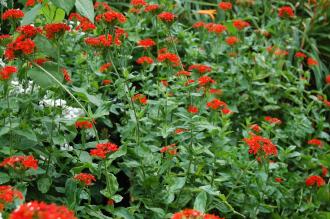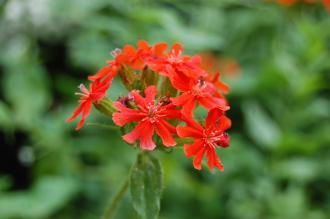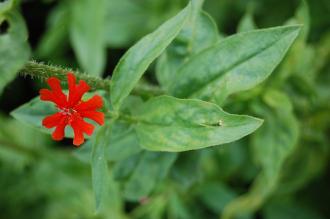
Lychnis chalcedonica (27/07/13, Kew Gardens, London)
Position: Full sun to light shade
Flowering period: Summer
Soil: Moist, well drained
Eventual Height: 1m
Eventual Spread: 50cm
Hardiness: 3a, 3b, 4a, 4b, 5a, 5b, 6a, 6b, 7a, 7b, 8a, 8b, 9a, 9b
Family: Caryophyllaceae
Lychnis chalcedonica is a deciduous herbaceous perennial with an upright habit. Its mid green leaves are ovate to lanceolate with entire margins, up to 12cm long and 5cm broad. Its red/ orange flowers are up to 3cm across, appear in clusters as domed heads and are up to 12cm across. Its fruit is a dry capsule. Its roots are short rhizomes.

Lychnis chalcedonica Flower (27/07/13, Kew Gardens, London)
Lychnis chalcedonica, commonly known as Rose Campion, Burning Love, Cross of Jerusalem, Meadow Campion, Red Robin or Scarlet Lychnis, is native to east Russia, Mongolia and north west China. This plant may be invasive if allowed to set seed.
The etymological root of the binomial name Lychnis is derived from the Greek lychnos meaning ‘a lamp’, in reference to its historic use as a lamp wick. Chalcedonica is named after the ancient Turkish town Chalcedon.
The landscape architect may find Lychnis chalcedonica useful as part of a herbaceous planting scheme. This perennial is not attractive to rabbits or deer.
Ecologically, Lychnis chalcedonica flowers are attractive to nectar loving insects.
The Royal Horticultural Society has given Lychnis chalcedonica their prestigious Award of Garden Merit in 1993.

Lychnis chalcedonica Leaf (27/07/13, Kew Gardens, London)
Lychnis chalcedonica prefers moist, fertile, well-drained soils. It tolerates most pH of soil. This plant dislikes dry soils.
Lychnis chalcedonica requires little maintenance. Large clumps may be divided in early spring.

